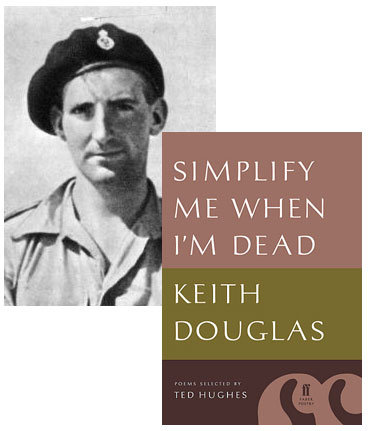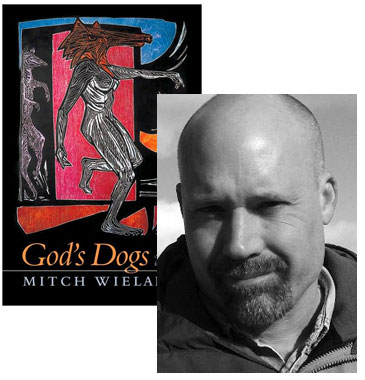Keith Douglas, “Syria”

These grasses, ancient enemies
waiting at the edge of towns
conceal a movement of live stones,
the lizards with hoded eyes
of hostile miraculous age.It is now snow on the green space
of hilltops, only towns of white
whose trees are populous with fruit
and girls whose velvet beauty is
handed down to them, gentle ornaments.Here I am a stranger clothed
in the separative glass cloak
of strangeness. The dark eyes, the bright-mouthed
smiles, glance on the glass and break
falling like fine strange insects.But from the grass, the incurable lizard,
the dart of hatred for all strangers finds
in this armour, proof only against friends,
breach after breach and like the gnat is busy
wounding the skin, leaving poison there.
People rightly remember the great British poets of the First World War, such as Wilfred Owen, but here in the States, at least, we have not heard nearly as much about Keith Douglas, who served with the Army in North Africa during the early part of the Second World War and then took part in the landing at Normandy—killed by a mortar attack three days later, at the age of 24. Simplify Me When I Am Dead, first published in 1964, is a powerful distillation (with poems selected by Ted Hughes) of his power. “Although they’re all set against the backdrop of the Second World War, they don’t deal much in politics and history, taking the enormity of their period as a given,” observed Ali Shaw. “Instead they focus on what it’s like to be alive in such times.”
Other poems include “Vergissmeinnicht (Forget-Me-Not)” and “How to Kill.” And, too, here’s an odd little film, a computer simulacrum, based on a photograph of Douglas, reading the poem that gives this collection its name:
26 May 2010 | poetry |
Mitch Wieland Honors “Tandolfo the Great”

How sharp is SMU Press editor Kathryn Lang’s eye for fiction? Here’s a hint: I’ve been reliably informed that two of this year’s nominees for the Binghamton University John Gardner Fiction Award come from this university press. You’ve already encountered Tracy Winn, the author of Mrs. Somebody Somebody, through our current series of guest essays; now here’s Mitch Wieland, the author of God’s Dogs, a “novel in stories” about a man who put his past behind him to move out west only to have it (in the form of his ex-wife and her son) catch up to him and settle into the cabin. Well, maybe “settle” isn’t the right word… Anyway, I got hooked into Ferrell’s story early; as Fiction Writer Review notes, “In an age of books built from blogs, tweets, and text messages, Mitch Wieland’s new novel-in-stories feels as though it were made of wood.” Here, Wieland pays tribute to another story with a raw and natural power.
When I need a swift dose of beauty and wisdom, I read the stories of Richard Bausch. Bausch’s lyrical prose and fierce intelligence, his abundant compassion and generosity, never fail to restore me. To my mind, Bausch is truly our modern Chekhov. Like that grand Russian godfather of the short story, Bausch’s work offers luminous insight into our meager race.
“Tandolfo the Great” is classic Bausch. Here we have his graceful language, both spare and lovely at the same time. Here we have Bausch’s fantastic characterization, where we not only witness his people from the outside, the limited external view, but we experiencetheir rich inner world, gain privy to the private workings of their hearts and minds. This compelling psychological component is Bausch’s forte. If fiction is indeed about human yearning, as many of us propose, then look no further for a master’s exquisite rendering of our complicated needs and desires. As the story’s scenes unfold, we continually access Tandolfo’s emotions and feelings—always nuanced to the dramatic moment—and we know deeply his thoughts as he responds to the world.
In “Tandolfo the Great,” our hero is a twenty-six-year-old loner named Rodney Wilbury. As a side job, Rodney moonlights as a clown (“the Great Tandolfo”) who performs magic acts at social gatherings. Our story opens with Tandolfo, already slightly tipsy in the afternoon, as he finishes his clown makeup before his bathroom mirror:
“She loves you not, oh, she doesn’t, doesn’t, doesn’t.”
25 May 2010 | selling shorts |

 Our Endless and Proper Work is my new book with Belt Publishing about starting (and sticking to) a productive writing practice.
Our Endless and Proper Work is my new book with Belt Publishing about starting (and sticking to) a productive writing practice. 
